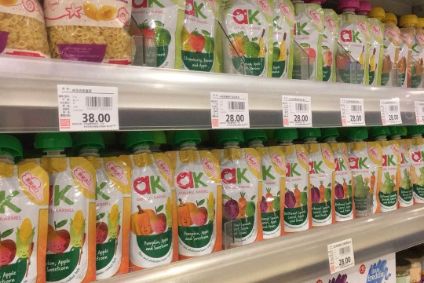
Annabel Karmel has launched its latest move to boost operations in China, part of plans to expand overseas that could see the UK-based baby and toddler food business enter the US.
The company, owned and run by the nutrition and cookery author of the same name, generates the bulk of its sales in the UK but has been building an international presence in recent years.

Discover B2B Marketing That Performs
Combine business intelligence and editorial excellence to reach engaged professionals across 36 leading media platforms.
In the autumn, Annabel Karmel entered China through a cross-border e-commerce deal with a listing on Alibaba’s T-mall platform. The business has since made a move into China’s bricks-and-mortar retail channel, with products now on sale in stores in and around Shanghai.
Raheel Rehman, head of export sales at Annabel Karmel, is aiming for the company’s products to be listed in 900 to 1,100 physical outlets in China by the end of the year.
And Rehman, who joined Annabel Karmel in 2017, has recently visited the US as part of research into whether and how the company could enter that market.
Speaking to just-food, Rehman said he had an eye on China becoming the business’ second-largest export market, behind Australia, by the end of 2020.

US Tariffs are shifting - will you react or anticipate?
Don’t let policy changes catch you off guard. Stay proactive with real-time data and expert analysis.
By GlobalData“With the current situation with Brexit, we aren’t too focused on Europe. China is a market with huge potential for baby food and bigger than the whole of Europe,” Rehman told just-food. “They love foreign brands, especially when it comes to formula milk, snacks and baby purees. They absolutely trust the UK brands. Ella’s Kitchen has been there and been successful. Little Freddie is there.
“[Our] distributor is based in Shanghai, so they are targeting all the main supermarkets, retailers in Shanghai first and then gradually expand it to other cities. We are going to target tier-one cities first and then tier-two. Once we have a good presence and some good sales and brand awareness, then we will gradually move to tier-three. In the first one year to 18 months, our focus will be on tier-one and tier-two for offline sales.”
Annabel Karmel pasta and puree products are on sale at China Yintai Group retail stores, as well as independent outlets. Rehman said the company was targeting chains – it has had talks with the likes of Vanguard and Carrefour – and smaller stores.
“The advantage we have with the small ones – where a lot of brands don’t tend to focus, at least not in the beginning – is the shelf space, the stand-out, the exposure you get from independents is hard to get from the mainstream supermarkets because of the competition on-shelf,” he explained.
Annabel Karmel is exporting to 16 countries, with Rehman saying “25-30%” of the firm’s around GBP11m (US$14.2m) in sales generated outside the UK.
Rehman said Annabel Karmel was at an early stage of research on the US. “The first thing for us to decide is whether we want to launch our UK range or potentially produce locally in the US. We are looking into different models and, within the next three to four months, we will come up with a plan.”



